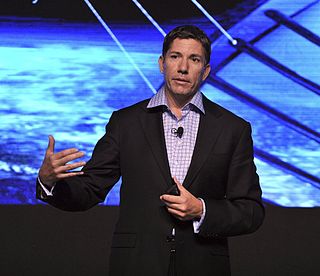A Quote by Craig Venter
'Bloomberg's, you know, for people who don't use the service, provides through the Internet - through specialized computers - information about the financial world. It's a very large data base. I think they have on the order of a billion dollars or more a year in revenue.
Related Quotes
The appropriation of public money always is perfectly lovely until some one is asked to pay the bill. If we are to have a billion dollars of navy, half a billion of farm relief, etc... the people will have to furnish more revenue by paying more taxes. It is for them, through their Congress, to decide how far they wish to go.
As the world transitions to the Internet of Everything - where people, processes, and data are intelligently connected - we'll be linked in even more ways. Here, billions and trillions of sensors around the earth and in its atmosphere will send information back to machines, computers, and people for further evaluation and decision-making.
This sounds crazy, I know, but you can make a billion dollars - very few people do - but you can make a billion dollars on a product. It can be "Lion King," it can be "Simpsons," it can be "Family Guy," who knows what it is. Or you can make zero. But you can't make a billion dollars if you don't own it.
Every day, I absorb countless data bits through emails, phone calls, and articles; process the data; and transmit back new bits through more emails, phone calls, and articles. I don't really know where I fit into the great scheme of things and how my bits of data connect with the bits produced by billions of other humans and computers.
In the Restoring Internet Freedom Order, the FCC strengthened its transparency rule so that Internet service providers must make public more information about their network management practices. They are required to make this information available either on their own website or on the FCC's website.
A 2011 report produced by Forrester Research estimated that the revenue generated through the sales of smartphone and tablet applications will reach $38 billion annually by 2015. Think about that: An industry that did not exist in 2006 will be generating $38 billion in revenues within a decade. . . .





































